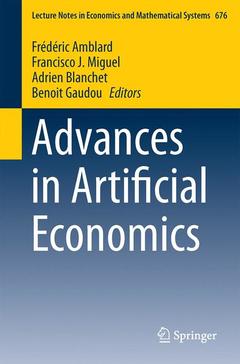Advances in Artificial Economics, 2015 Lecture Notes in Economics and Mathematical Systems Series, Vol. 676
Coordonnateurs : Amblard Frédéric, Miguel Francisco J., Blanchet Adrien, Gaudou Benoit

Frédéric Amblard was awarded a PhD degree (agent-based social simulation) in 2003 from the University Blaise Pascal, Clermont-Ferrand. He then spend one year as a post-doc at the ENS-Ulm. In 2004, he became associate professor in Computer Science at the University Toulouse 1 Capitole and joined the IRIT-SMAC team. He has been implied in several European projects (FP6 IMAGES, FP7 COSIN, FP7 QLectives) and ANR projects (MAGeo, COSMAGEMS) and currently participates in the coordination of the MAELIA project, dedicated to the multi-agent simulation for the management of water resources. He coordinated several industrial projects with major actors (EDF R&D, France Télécom R&D). In 2013 he received an award for scientific excellence (PES).
Francesc Josep Miguel holds a PhD in Sociology from the Universitat Autònoma de Barcelona (UAB) and a University Specialist Degree in Sociology of Consumption from the Universidad Complutense de Madrid. Miguel Quesada is an Associate Professor at UAB responsible for courses in Methodology for the Social Sciences, Sociology of Consumption and Applied Statistics for Marketing Analysis. He has conducted research in the fields of sociology of consumption, social indicators in relation to the situation of women in contemporary society, and the analysis of school-to-work transitions. At present he mainly works in the domain of “computational sociology” - an applied branch of artificial intelligence that merges social science and computer simulation techniques to model complex policy issues and societal dynamics - and, as GSADI member and as Director of the “Laboratory for Socio-Historical Dynamics Simulation” (LSDS) he is involved in several projects about the use of agent-based social simulation for the modelling of social networks dynamics and evolution of social behavior.
Adrien Blanchet became Associate Professor at the GREMAQ in 2008. He earned a PhD degree in 2005 fromthe University Pari
Date de parution : 11-2014
Ouvrage de 243 p.
15.5x23.5 cm
Thèmes d’Advances in Artificial Economics :
Mots-clés :
Artificial Economics; Complex Systems; Multi-agent Systems; Simulation



